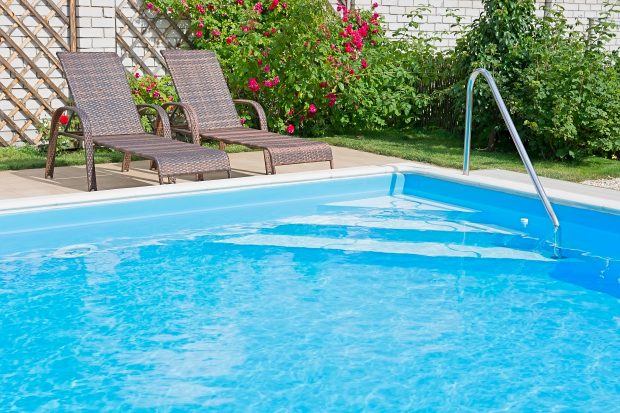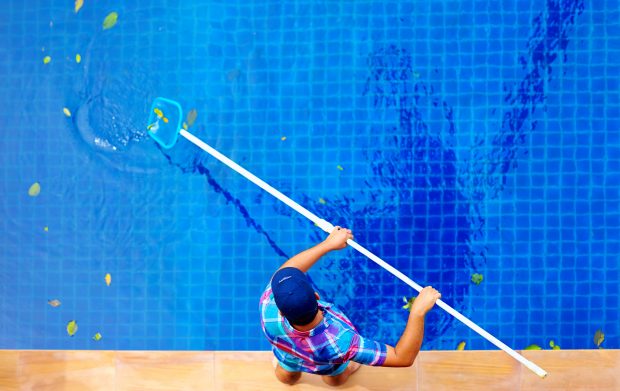Pool owners are all aware of the critical nature of pool maintenance. Inadequate care and upkeep will turn it into an attractive breeding place for insects such as mosquitoes, which can pose a threat to your safety.

Pool maintenance is an essential part of pool ownership. Thankfully, it isn’t as difficult as many others say. Below are basic tips for pool maintenance that you must be aware of.
1. Check The Pool Chemistry Regularly
Chemical balance is probably the most critical aspect of pool upkeep. Pool water that is not well balanced appears muddy, hurts the skin, and could be a breeding place for microbes. Preferably, you should monitor your water chemicals weekly.
It’s also simpler to manage pool chemistry than before. Thanks to the variety of discount pool supplies available nowadays. The majority of pool owners use reagent kits to determine the chemical balance of the water.
Reagent kits are not overly complicated to use. You just have to collect sample water from the pool and pour the test liquid from the kit, the color of the water shifts to indicate its chemical balance.
2. Maintain The Proper pH Levels
The pool water’s pH levels should be checked on a daily basis to ensure that it is safe and stable. The pH scale varies from zero to 14 in terms of acidity and alkalinity. A rating of 7.2 to 7.8 is optimal. This level is comfortable for swimmers and enables sanitizing chemicals to operate at maximum performance.
A pH strip test may be used to check the pH of your pool water. This test functions in a unique way. When they are submerged in water for several seconds, the pigments in them shift color. Then, using the color map from the kit, compare the strip to assess the pH level of the water. Utilize this data to determine the type and quantity of chemicals the pool water requires.
3. Skim And Scrub
Skimming is a necessary part of pool upkeep, perhaps more so for pools that are surrounded by plants and other vegetation. Take away leaves and other debris on the surface of the pool using a long-handled skimmer. Skimming twice a week is recommended to maintain the pool’s flawless appearance.
Along with skimming, you must scrub the pool’s surfaces to avoid algae from developing. Fortunately, it doesn’t have to be observed as frequently. Scrubbing once every two weeks is sufficient. Simply keep an eye out for algae growths and brush them away immediately.
4. Maintain Water Level
After skimming the debris, it’s a great idea to monitor the water level. Make sure it doesn’t drop under the skimmer’s height, or else the pump could be affected. If the water volume is relatively low, replenish it using a water hose.
If you empty your pool for cleaning or after the summer season has ended, be cautious not to leave it drained for an extended period of time. It’s better to keep water in a pool all season, so the volume of water balances out the pressures from the ground.
5. Shock Your Water
Organic toxins such as ammonia accumulate in a pool after some time. Large volumes of such pollutants may react with chlorinated water and form chloramines. These chloramines emit a strong chlorine odor and may cause irritation on the skin.
To remove this noxious odor, pool water must be super chlorinated – or shocked – down to natural chlorine amounts. Although it might sound contradictory, applying a high concentration of chlorine to water will eliminate the odor and keep your pool safe. To obtain the best outcomes, observe the product’s directions prior to shocking your pool.
6. Trust The Experts
At times, you must put your trust in a professional. You may lack awareness about how to maintain your pool’s mechanical devices. So, it’s best to get a pool service specialist to inspect the equipment annually. This is also preferable for above ground pools that require an automated cleaning mechanism.
Prior to the inspection, do a rigorous checking of the pool. Make a note about any cracks in the pipes, strange noises systems, and unusual odors coming from the water. Report them to the experts so they can quickly know what to do.
Bottom Line
By maintaining a regular cleaning schedule, you may avoid paying for significant pool repair expenses. Always apply the appropriate chemical formulations and check the pH levels of your pool water.
Keep in mind that detecting and resolving a minor issue now will stop you from needing to deal with a major disaster later. And by integrating these pool care ideas into your cleaning schedule, you can guarantee that you’ll have more time relaxing than cleaning.




